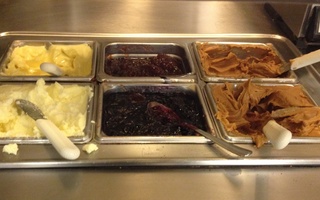Preparation of Food
The Committee did not have to conduct an exhaustive investigation in order to discover that the general feeling is that much of the food served in the dining halls is poorly prepared. Complaints about cooking are traditional at Harvard as well as at other institutions. What the Committee attempted to do was to determine to what extent the complaints are chronic and unavoidable, and to what extent they could be removed by better preparation and more careful choice of dishes.
By checking on a number of occasions the amount of food returned to the kitchens uneaten, the Committee came to the conclusion that certain dishes reach the students cold and flavorless. Particular offenders in this respect are certain vegetables: broccoli, string beans, celery, spinach, brussels sprouts, and cabbage, to name but a few. For example, at lunch on February 27 in Leverett House 42 orders of lima beans were returned to the kitchen uneaten or barely tasted; 196 people were served at lunch that day. On the preceding day at lunch in the same dining hall, 40 orders of parslied potatoes were sent back uneaten when 208 people were served. At Eliot House on that same day 238 people were served, and 49 orders of stewed tomatoes were returned to the kitchen. The Committee believes after canvassing a large number of students that the preparation of these vegetables and of bacon and eggs is such that it would be impossible to operate the dining halls without a guaranteed patronage.
The cause of this situation is twofold: persistent serving of unpopular dishes, and incompetent cooking. The first problem is a simple one to solve. At the present time Harvard has no dietitian. The menus are made up entirely by Mr. Robertson, the Head Steward in the Kirkland House kitchen. While this is in no sense intended as a criticism of Mr. Robertson's judgment, it is only fair to point out that he has many other responsibilities, and that to the best of the Committee's knowledge, Harvard is one of the few colleges which has no resident dietitian devoting his entire time to planning menus.
The second problem, incompetent cooking, is not so easily met. Partly it is inherent in the mass-production of meals. But nevertheless the Committee believes there is room for improvement in the cooking. The root of the trouble lies in inexperienced and inefficient cooks. As an example of this, it was pointed out by Mr. Stefani, himself an experienced cook, that the broccoli served in the Union is prepared by a man who has had no outside cooking training, and is cooked in such a way that about 50% of the flavor and food value is lost. There is reason to believe that this sort of incompetency is not limited to a single instance.
The Committee finds, therefore, that the choice of dishes served in the dining halls is often poorly made and in a number of cases the food is prepared with carelessness and incompetence.
V
Choice of Extra Dishes
It is the opinion of the Committee after studying figures on costs compiled by Mr. Durant and after sounding out student opinion on the subject, that the economy which would be effected by eliminating the alternate dishes always available in the dining halls (fruit salad, second portions, club sandwiches, ice cream, etc.) would be far too small to justify the corresponding reduction in the variety of food offered to students.
VI
Waste
As a preliminary check on the amount of waste involved in dining hall food which is not eaten, the Committee held a check on February 21 to determine the amount of bread and butter thrown away after being returned to the kitchen. At lunch that day in Leverett House observers found that 62 rolls were thrown away, two leaves of bread, and 50 cakes of butter. The food thrown away was returned to the kitchen completely untouched; the butter was still in bowis with ice and water, and the bread was still on the bread plates.
Finding ample evidence to indicate that a broader survey was advisable, the Committee asked Mr. Westcott's permission to conduct similar checks in all the House dining halls. This permission was readily granted.
The Committee then checked five more meals in Leverett House, three in Adams, two in Eliot, two in Lowell, three in Dunster, and one in Winthrop. In Adams and Eliot it found the same kind of waste as in Leverett. For example, in Adams House at dinner on February 27, 230 slices of bread were thrown out; at Eliot House that same night 91 slices of bread were thrown away. But in the other Houses the Committee found no waste, but ample indication that waste was general; obviously the order had come down from above to indulge in some window-dressing for the Committee's benefit. For example, the waitresses had to be told repeatedly not to throw butter away, but to save it, thus proving conclusively that when no one was there to check up, the butter was wasted. The waitresses took the economy drive as a big joke, and freely admitted that they ordinarily threw away left-over bread and butter and had never before been instructed to do otherwise. On the day the Committee checked in Lowell House, two waitresses reported that only a few days before five whole pies had been removed from their tins and thrown away.
The Committee then talked to Mr. Robertson, who denied that bread and butter were ever thrown away, and said that not more than one per cent of the food cooked was ever wasted.
Read more in News
Various Exhibits Now on Display in Widener LibraryRecommended Articles
-
Cliffies Will Not Scrape PlatesRadcliffe girls may end up scraping dishes someday, but they won't do it before they have to. Cliffies' lack of
-
Dining Halls Combat Silverware, Dish TheftDirty dishes are piling up across campus—but they’re not in the dining halls. Harvard University Dining Services (HUDS) has posted
-
 A Roller-Coaster Year for Dining Halls
A Roller-Coaster Year for Dining Halls -
IMPROVEMENTS PROMISED FOR LOWELL'S MENUPromising an investigation designed to improve the quality of the cooking in the Lowell House dining hall, Roy L. Westcott,
-
 Flyby Investigates: The Disappearance of Honey Butter
Flyby Investigates: The Disappearance of Honey Butter













